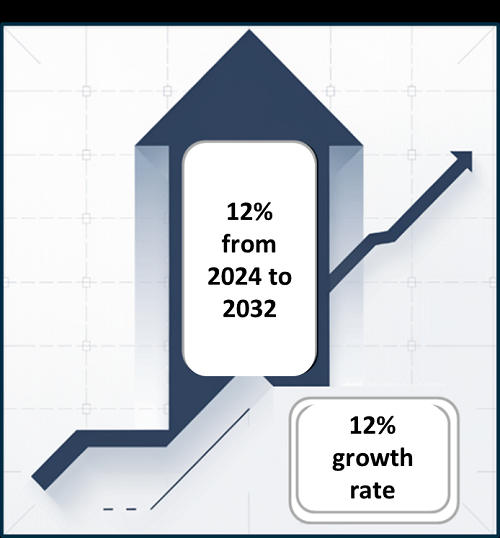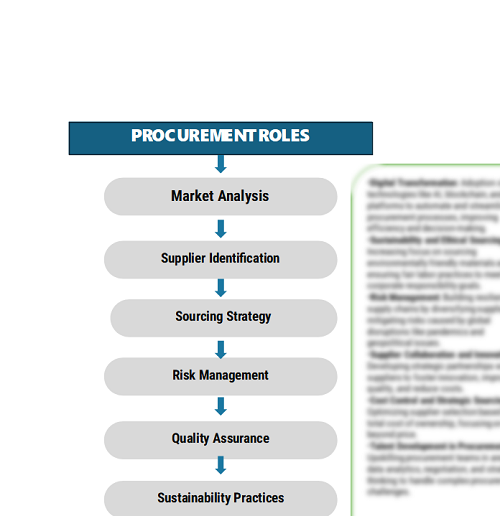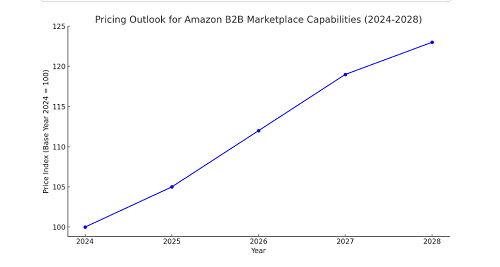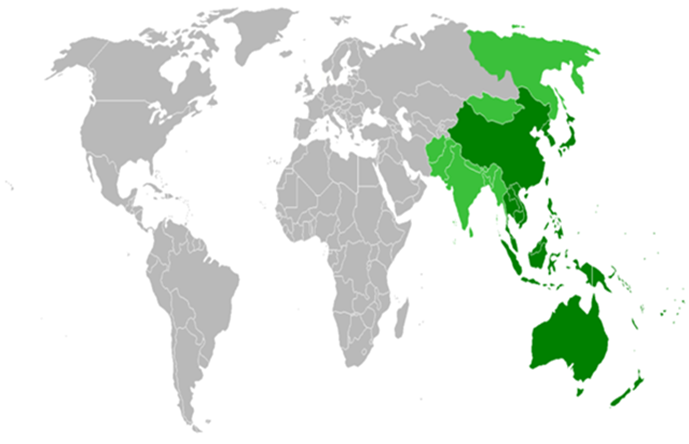The Amazon B2B marketplace is rapidly evolving as a significant platform for businesses seeking efficient procurement solutions. With its vast array of products, streamlined purchasing processes, and competitive pricing, Amazon B2B is becoming a preferred choice for companies looking to optimize their procurement strategies. This marketplace is supported by advanced technological infrastructure, enabling seamless transactions and providing access to a wide range of suppliers and products. Our report delivers an in-depth analysis of the key capabilities of the Amazon B2B marketplace, highlighting its role in driving efficiency, cost savings, and enhanced supplier collaboration. Additionally, we address future procurement challenges and emphasize the importance of digital procurement tools in accurately forecasting market needs to keep clients ahead in this dynamic landscape. Strategic sourcing and procurement management play a crucial role in streamlining the procurement process for B2B development. As competition intensifies, companies are leveraging market intelligence solutions and procure analytics to optimize their supply chain management systems. The outlook for the Amazon B2B marketplace is highly positive, with several key trends and projections indicating robust growth through 2032: Market Size: The Amazon B2B marketplace is projected to reach approximately USD 130 billion by 2032, reflecting a compound annual growth rate (CAGR) of about 12% from 2024 to 2032. Growth rate 12% Sector Contributions: Growth is primarily driven by: Small and Medium Enterprises (SMEs): Increasing adoption of online procurement solutions among SMEs is boosting demand for B2B products. Corporate Purchases: Large enterprises are leveraging Amazon’s extensive catalog for bulk purchasing and supply chain optimization. Technological Transformation and Innovations: Advances in digital technologies, including AI-powered recommendation systems and automated order fulfilment solutions, are enhancing the efficiency and user experience on the Amazon B2B marketplace. These innovations are helping businesses streamline procurement processes and improve buyer-supplier interactions. Additionally, supplier performance management and vendor performance assessment are becoming increasingly critical for businesses in this competitive landscape, ensuring that vendors meet quality standards, delivery timelines, and customer service expectations Customer-Centric Approach: Amazon B2B focuses on tailored experiences for business customers, including personalized pricing, bulk purchasing options, and specialized customer support. Global Reach: With a presence in multiple countries, Amazon B2B is well-positioned to cater to the growing international demand for efficient procurement solutions. Digital Transformation: The move towards digital procurement platforms is revolutionizing traditional purchasing methods, enabling businesses to manage orders, track shipments, and analyse spending from a single dashboard. Supplier Diversity: Amazon B2B is committed to promoting diverse suppliers, helping businesses fulfil corporate social responsibility goals and improve supply chain resilience. Integration with Procurement Systems: The platform’s ability to integrate with existing enterprise resource planning (ERP) systems is enhancing procurement workflows and improving overall operational efficiency. Growth Drivers: E-commerce Expansion: The rapid growth of e-commerce is driving businesses to adopt online procurement solutions for efficiency and convenience. Cost-Effectiveness: Competitive pricing and access to exclusive deals on bulk purchases are compelling reasons for businesses to choose Amazon B2B. User Experience: A focus on user-friendly interfaces and streamlined processes is attracting more businesses to utilize Amazon’s B2B services. Supply Chain Resilience: The need for agile supply chain solutions in the face of global disruptions is pushing companies to explore robust procurement options like Amazon B2B. Enhanced Analytics: Advanced analytics capabilities offered by the platform are enabling businesses to gain insights into purchasing patterns, helping them make informed procurement decisions. Recent analysis reveal that the Amazon B2B marketplace is experiencing increasing demand for its capabilities, particularly in areas such as bulk purchasing, diverse supplier networks, and data-driven procurement solutions. To navigate the evolving landscape, market reports provide detailed insights into pricing trends, supplier performance, and customer engagement strategies. This information empowers businesses to effectively manage their procurement processes while ensuring access to competitive pricing and a wide range of products. By leveraging insights from these reports, stakeholders can implement strategies to enhance their procurement efficiency and optimize their supply chains. Procurement Intelligence for Amazon B2B Marketplace Capabilities: Category Management and Strategic Sourcing Pricing Outlook for Amazon B2B Marketplace Capabilities: spend analysis The graph shows a general upward trend in pricing for amazon B2B marketplace capabilities, likely due to rising costs, increased complexity, and growing demand. However, there may be fluctuations influenced by economic conditions, technological advancements, and competitive dynamics. The Amazon B2B marketplace is experiencing significant shifts in pricing and capabilities, reflecting the increasing demand for streamlined procurement solutions. The current pricing landscape is influenced by competitive pressure, enhanced service offerings, and the growing need for digital transformation in procurement processes. Comprehensive Price Forecast: Our detailed analysis indicates a steady increase in transaction volumes driven by several key factors, including: Rising Supplier Participation: More suppliers are joining the marketplace, increasing competition and offering a wider range of products and services. Enhanced Digital Tools: Investments in technology, such as AI-driven analytics and machine learning, are improving procurement efficiency and driving adoption rates. Customization of Offerings: Amazon is expanding its capabilities to provide tailored solutions for businesses, such as bulk purchasing and specialized shipping options. We anticipate a robust growth trajectory in the B2B segment, with year-on-year increases reflecting ongoing digital transformation and the integration of advanced procurement technologies. As businesses increasingly leverage e-commerce for their procurement needs, stakeholders can expect not only enhanced operational efficiencies but also potential cost savings through improved pricing strategies. Our insights emphasize procurement strategies that can help organizations optimize their purchasing decisions, manage supplier relationships effectively, and take advantage of Amazon's competitive pricing structures. Marketplace Commissions (XX%) Description: Represents the fees charged by Amazon to sellers for using the platform, typically calculated as a percentage of sales. Trends: Amazon Business generated approximately $35 billion in gross merchandise value in 2022, reflecting significant growth in transaction volumes. This increase necessitates ongoing adjustments in commission structures to remain competitive while supporting enhanced services for businesses . Logistics and Fulfillment (XX%) Description: XX Trends: XX Technology and Platform Maintenance (XX%) Description: XX Trends: XX Advertising and Marketing (XX%) Description: XX Trends: XX Optimizing procurement in the Amazon B2B marketplace can lead to substantial cost savings and improved operational efficiency. Businesses can take advantage of bulk purchasing options and customized pricing, allowing them to secure discounts and better align with budgetary constraints. Amazon Business also offers a diverse product selection tailored for various industries, enhancing accessibility to necessary supplies. Automated pricing and inventory management tools help maintain competitive pricing, while streamlined logistics through Amazon's fulfilment services can reduce shipping costs. Additionally, enhanced visibility through certifications aids procurement professionals in meeting compliance requirements, making it easier to establish valuable connections with large organization Supply and Demand Overview of the Amazon B2B marketplace Capabilities: Demand-Supply Dynamics and Buyer Intelligence for Effective Supplier Relationship Management (SRM)" The Amazon B2B marketplace, known as Amazon Business, is experiencing robust growth driven by its innovative features and increasing demand among businesses for streamlined procurement processes. The marketplace is projected to reach approximately $83.1 billion in annual gross merchandise volume by 2025, highlighting its dominance in the B2B sector. Demand Factors: Increased E-commerce Adoption: Businesses are increasingly shifting to online platforms for procurement, fostering a higher demand for B2B solutions. Bulk Purchasing Needs: Companies are looking for suppliers that can provide bulk purchasing options, quantity discounts, and recurring deliveries. Integration of Technology: Enhanced technological capabilities, including advanced search features and analytics, improve the shopping experience for business customers. Specialized Product Offerings: Amazon Business provides unique products not available in the consumer market, such as medical supplies and industrial goods, attracting a diverse customer base Supply Factors: Diverse Seller Base: More than half of Amazon Business sales come from third-party sellers, ensuring a wide range of products and competitive pricing Streamlined Procurement Solutions: Features such as purchase orders, payment terms, and a tailored Business Prime membership cater specifically to B2B needs, enhancing customer satisfaction. Global Reach and Accessibility: Amazon Business operates in multiple countries, facilitating international trade and procurement processes. Continuous Innovation: Ongoing improvements in logistics and fulfilment capabilities bolster supply chain efficiencies, making the marketplace more attractive to businesses The image shows growing demand for Amazon B2B marketplace capabilities in both North America and Asia, with potential price increases and increased competition North America: Leading the B2B Marketplace Evolution North America, particularly the U.S., is at the forefront of the Amazon B2B marketplace, driven by several key factors: Market Dominance: Amazon Business has rapidly grown to an impressive $35 billion in annual gross merchandise volume (GMV) as of 2023, with projections suggesting it could reach approximately $100 billion in the coming years. This places Amazon at a significant position within the B2B sector, accounting for a substantial share of all B2B marketplace sales. Diverse Product Range: The platform offers a wide array of products tailored for business needs, including bulk buying options, recurring deliveries, and exclusive business memberships like Business Prime. Such features are designed to streamline procurement for organizations, from government entities to educational institutions. Strong Third-Party Seller Engagement: Over half of Amazon Business sales stem from third-party sellers, highlighting a collaborative ecosystem that enhances product availability and diversity. This model benefits both sellers and buyers by increasing competition and lowering prices. Investment in Digital Procurement Solutions: As businesses increasingly transition from traditional purchasing methods to online platforms, Amazon Business facilitates this shift by simplifying the buying process. The digital marketplace effectively addresses the complexities of B2B transactions, which historically have been less efficient than consumer sales. Forecast for Future Growth: With the ongoing trend of digital transformation in B2B commerce, Amazon Business is expected to maintain its trajectory of growth, potentially commanding a dominant share of the market in the years ahead. Supplier Landscape: Supplier Negotiations and Strategies Currently, the supplier landscape is characterized by a broad spectrum of suppliers catering to various industries, from electronics and industrial equipment to office supplies and raw materials. However, significant consolidation is occurring among top-tier suppliers, who dominate the marketplace's share. At the same time, smaller and emerging suppliers are gaining traction by offering niche products, competitive pricing, and customized solutions to meet specific business needs. Some of the raw material suppliers within the Amazon B2B marketplace include: Global Industrial Uline Grainger MSC Industrial Supply Co. Fastenal VWR International Staples Business Advantage Office Depot Business Solutions ConocoPhillips 3M Key Development: procurement category significant development Development Description Impact Expansion of Product Offerings Amazon B2B has significantly increased its product range, now offering millions of industrial and scientific supplies. Enhanced supplier selection and competition for buyers. Advanced Analytics and Insights Implementation of data analytics tools to provide businesses with insights into purchasing trends and inventory management. Improved decision-making and procurement efficiency. Enhanced User Experience Updates to the user interface and search functionalities, making it easier for businesses to find and order products. Streamlined purchasing process and increased user satisfaction. Flexible Payment Options Introduction of various payment solutions, including invoicing and credit terms tailored for B2B transactions. Increased financial flexibility for businesses. Procurement Attribute/Metric Details Market Sizing The Amazon B2B marketplace is projected to grow from USD 35.9 billion in 2024 to USD 130 billion by 2032, with a CAGR of 12% (2023-2032). Adoption Rate 60% of businesses globally are leveraging Amazon B2B for streamlined procurement, with significant growth among SMEs. Top Procurement Strategies for 2024 Focus on leveraging bulk discounts, improving supply chain visibility through analytics, and vendor consolidation via Amazon’s platform. Process Automation 40% of procurement teams report enhanced efficiency using Amazon’s automated purchase tracking and invoicing systems. Procurement Challenges Key challenges include competition among sellers, price volatility, and managing logistics for large orders. Key Suppliers Notable suppliers include AmazonBasics, Lenovo, 3M, HP, and Procter & Gamble, offering a diverse range of products. Key Regions Covered North America, Europe, and Asia-Pacific, with major focus on the U.S., Germany, Japan, and India due to higher transaction volumes. Market Drivers and Trends Growth driven by digital procurement trends, increased adoption by enterprises, and demand for centralized vendor management. Key trends include the rise of subscription-based procurement and advanced analytics tools.Amazon B2B Marketplace Capabilities Overview

Key Trends and Sustainability Outlook
Overview of Market Intelligence Services for the Amazon B2B Marketplace Capabilities

To stay ahead in the Amazon B2B marketplace, businesses are optimizing procurement strategies, leveraging spend analysis solutions for vendor spend analysis, and enhancing supply chain efficiency through market intelligence. Procurement category management and strategic sourcing are becoming vital in achieving cost-effective procurement and ensuring the timely availability of a wide range of products from trusted suppliers. These strategies help businesses streamline purchasing decisions, reduce costs, and improve supplier relationships, ensuring seamless operations in the highly competitive B2B environment.
Product Cost Outlook for the Amazon B2B Marketplace Capabilities: Total cost of ownership TCO and cost saving opportunities

Cost saving opportunity: Negotiation Lever and Purchasing Negotiation Strategies

Regional Demand-Supply : Amazon B2B Marketplace Capabilities

North America remains a key hub Amazon B2B Marketplace Capabilities innovation and growth

The supplier penetration in the Amazon B2B marketplace is extensive, with a growing number of global and regional players offering a diverse range of products and services. These suppliers play a critical role in the overall marketplace dynamics, influencing pricing, product availability, and service quality. The marketplace is highly competitive, with suppliers ranging from large multinational corporations to small and medium-sized enterprises (SMEs) offering specialized goods and services.

Frequently Asked Questions (FAQ):
Our procurement intelligence services offer a detailed analysis of the Amazon B2B Marketplace, identifying key suppliers and product categories. We provide spend analysis, supplier performance evaluations, and market intelligence to help you source products efficiently and cost-effectively through Amazon’s platform.
We assist in evaluating the Total Cost of Ownership (TCO) by factoring in procurement costs, shipping fees, storage, handling costs, and return management. Our cost analysis services ensure you understand the full financial impact of sourcing through the Amazon B2B Marketplace.
We provide a detailed risk management framework, addressing potential supply chain disruptions, vendor reliability, and compliance with Amazon’s policies. Our solutions help mitigate risks and ensure a stable and timely supply of products from the platform.
Our Supplier Relationship Management (SRM) services guide you in building strong partnerships with sellers on Amazon B2B. We focus on improving collaboration, negotiating favorable terms, and ensuring consistent product quality, while maintaining cost efficiency.
We provide a comprehensive breakdown of procurement best practices for sourcing from Amazon B2B, including supplier categorization, pricing strategies, and contract management to ensure strategic procurement decisions.
Digital transformation helps streamline procurement through automation, real-time analytics, and integration with your procurement system. Our solutions enable you to track supplier performance, monitor market trends, and optimize procurement strategies efficiently.
Our supplier performance management services help you assess and monitor seller reliability on Amazon B2B, ensuring that they meet quality standards, delivery deadlines, and compliance with Amazon’s requirements. This ensures better decision-making and reduces procurement risks.
We provide insights into negotiation strategies, offering support to secure better pricing, bulk discounts, and flexible payment terms with sellers on Amazon B2B. Our data-driven approach ensures your negotiations are backed by market intelligence.
We offer advanced market analysis tools that provide insights into Amazon B2B market trends, supplier market share, and price forecasts. This data helps you identify opportunities and make informed purchasing decisions on the platform.
Our procurement solutions include guidance on ensuring regulatory compliance when sourcing from Amazon B2B. We help you navigate Amazon’s policies, ensuring that all suppliers meet the required safety, quality, and regulatory standards.
We offer strategies to mitigate supply chain disruptions by identifying alternative suppliers on Amazon B2B, establishing contingency plans, and monitoring the marketplace for any potential issues. Our insights help you maintain a stable and continuous supply.
Through our supplier performance tracking tools, we help you monitor key metrics such as product quality, delivery timelines, and customer feedback. Regular supplier evaluations ensure transparency and help you optimize future procurement decisions on Amazon B2B.
We assist in identifying suppliers on Amazon B2B who implement sustainable practices in their product sourcing and packaging. Our sustainability assessments ensure the suppliers you choose align with your environmental and ethical standards.
Our pricing analysis services allow you to compare product costs across different Amazon B2B suppliers, ensuring you achieve competitive pricing. We analyze pricing trends, market dynamics, and negotiation levers to help you secure the best value.
We provide an in-depth analysis of market opportunities and risks, highlighting emerging trends and shifts within Amazon B2B. Our insights help you stay ahead of the competition and identify strategic procurement opportunities to leverage on the platform.
Table of Contents (ToC)
Executive Summary: Market Overview, Procurement Insights, and Negotiation
Leverage
. Amazon B2B Marketplace Capabilities Overview
. Key Highlights
. Supply Market Outlook
. Demand Market Outlook
. Category Strategy Recommendations
. Category Opportunities and Risks
. Negotiation Leverage and Key Talking Points
. Impact of Macroeconomic Factors (e.g., COVID-19, Inflation)
Research Methodology: Procurement Intelligence, Market Analysis, and Spend
Analysis Tools
. Definition and Scope
. Research Objectives for Amazon B2B Marketplace Capabilities
. Data Sources and Approach
. Assumptions and Limitations
. Market Size Estimation and Forecast Methodology
Market Analysis and Category Intelligence
. Market Maturity and Trends
. Industry Outlook and Key Developments
. Drivers, Constraints, and Opportunities
. Regional Market Outlook within the Amazon B2B Marketplace
. Procurement-Centric Five Forces Analysis
. Mergers and Acquisitions (M&As)
. Market Events and Innovations
Cost Analysis, Spend Analysis, and Pricing Insights
. Cost Structure Analysis
. Cost Drivers and Savings Opportunities
. Total Cost of Ownership (TCO) Analysis
. Pricing Analysis and Expected Savings
. Billing Rate Benchmarking
. Factors Influencing Pricing Dynamics
. Contract Pointers and SLAs
. Market Cost Performance Indicators
. Risk Assessment and Mitigation Strategies
. Spend Analytics and Cost Optimization
Supplier Analysis and Benchmarking
. Amazon B2B Marketplace Supply Market Outlook
. Supply Categorization and Market Share
. Amazon B2B Marketplace Supplier Profiles and SWOT Analysis
. Supplier Performance Benchmarking
. Supplier Performance Evaluation Metrics
. Disruptions in the Supply Market
Technology Trends and Innovations
. Current Industry Technology Trends
. Technological Requirements and Standards
. Impact of Digital Transformation
. Emerging Tools and Solutions
. Adoption of Standardized Industry Practices
Procurement Best Practices
. Sourcing Models and Strategies
. Pricing Models and Contracting Best Practices
. SLAs and Key Performance Indicators (KPIs)
. Strategic Sourcing and Supplier Negotiation Tactics
. Industry Sourcing Adoption and Benchmarks
Sustainability and Risk Management: Best Sustainability Practices
. Supply Chain Sustainability Assessments
. Corporate Social Responsibility (CSR) Alignment
. Risk Identification and Assessment
. Contingency Planning and Supplier Diversification
. Holistic Risk Mitigation Strategies
Category Strategy and Strategic Recommendations
. Market Entry Strategies
. Growth Strategies for Market Expansion
. Optimal Sourcing Strategy
. Investment Opportunities and Risk Analysis
. Supplier Innovation Scouting and Trends
. Cross-Functional Collaboration Frameworks
Future Market Outlook
. Emerging Market Opportunities
. Predictions for the Next Decade
. Expert Opinions and Industry Insights
Appendices: Procurement Glossary, Abbreviations, and Data Sources
. Glossary of Terms
. Abbreviations
. List of Figures and Tables
. References and Data Sources








